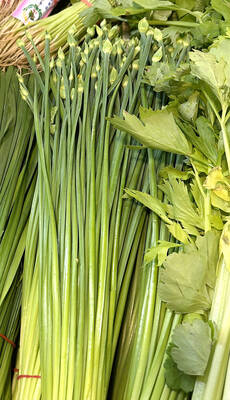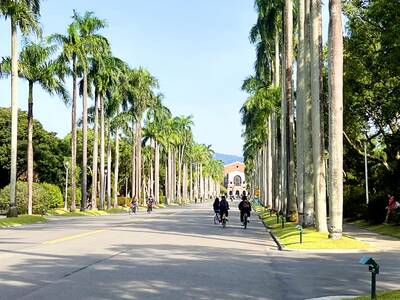Seasonal allergies could cause black circles and wrinkles around the eyes, a Taichung-based doctor of traditional Chinese medicine said.
Yen Hung-rong (顏宏融), a Chinese medicine pediatrician at China Medical University Hospital, said allergy-related nose blockages could impede circulation in the nasal cavity and affect the subcutaneous tissue around the eyes.
Lacking oxygen, blood in the subcutaneous tissue could take on a dark hue, forming black circles, while allergies cause eye and nose discomfort, and could prompt habitual scratching, which over time forms wrinkles, he said.
Although some believe allergies are more prevalent in autumn or winter, the onset of summer brings with it humidity, dust and mites, and people experience temperature shifts when moving between outdoor and air-conditioned environments, which are known allergy triggers, he said.
Certain types of allergies, such as the ones that cause black circles, have subtle, hard-to-detect symptoms, he said.
To reduce allergy risks in summer, people should regularly launder their bed sheets and blankets to reduce dust and mites, he said.
Deep-fried or cold foods should be avoided, while foods that Chinese medicine considers to be “neutral,” such as spinach, corn, pumpkin, bean sprouts, apple, papaya, string bean, chicken, and common and Chinese cabbage, should be increased, he said.
Allergic episodes occur when the immune system responds to allergens, which causes histamine to be released, he said, adding that encouraging good gut microbiota growth could alleviate the problem.
One of his patients, a woman in her 20s, was piqued by the black circles and wrinkles around her eyes that skincare products and dermatologists could not treat, he said.
The symptoms were brought under control after an allergy was identified as the cause, he said.

The government should improve children’s outdoor spaces and accelerate carbon reduction programs, as the risk of heat-related injury due to high summer temperatures rises each year, Greenpeace told a news conference yesterday. Greenpeace examined summer temperatures in Taipei, New Taipei City, Taoyuan, Hsinchu City, Taichung, Tainan and Kaohsiung to determine the effects of high temperatures and climate change on children’s outdoor activities, citing data garnered by China Medical University, which defines a wet-bulb globe temperature (WBGT) of 29°C or higher as posing the risk of heat-related injury. According to the Central Weather Administration, WBGT, commonly referred to as the heat index, estimates

The Taipei Department of Health’s latest inspection of fresh fruit and vegetables sold in local markets revealed a 25 percent failure rate, with most contraventions involving excessive pesticide residues, while two durians were also found to contain heavy metal cadmium at levels exceeding safety limits. Health Food and Drug Division Director Lin Kuan-chen (林冠蓁) yesterday said the agency routinely conducts inspections of fresh produce sold at traditional markets, supermarkets, hypermarkets, retail outlets and restaurants, testing for pesticide residues and other harmful substances. In its most recent inspection, conducted in May, the department randomly collected 52 samples from various locations, with testing showing

Taipei and other northern cities are to host air-raid drills from 1:30pm to 2pm tomorrow as part of urban resilience drills held alongside the Han Kuang exercises, Taiwan’s largest annual military exercises. Taipei, New Taipei City, Keelung, Taoyuan, Yilan County, Hsinchu City and Hsinchu County are to hold the annual Wanan air defense exercise tomorrow, following similar drills held in central and southern Taiwan yesterday and today respectively. The Taipei Mass Rapid Transit (MRT) and Maokong Gondola are to run as usual, although stations and passenger parking lots would have an “entry only, no exit” policy once air raid sirens sound, Taipei

Taipei placed 14th in the Quacquarelli Symonds (QS) Best Student Cities 2026 list, its highest ever, according to results released yesterday. With an overall score of 89.1, the city climbed 12 places from the previous year, surpassing its previous best ranking of 17th in 2019. Taipei is “one of Asia’s leading higher-education hubs,” with strong employer activity scores and students “enjoying their experience of the city and often keen to stay after graduation,” a QS staff writer said. In addition to Taipei, Hsinchu (71st), Tainan (92nd), Taichung (113th) and Taoyuan (130th) also made QS’ list of the top 150 student cities. Hsinchu showed the